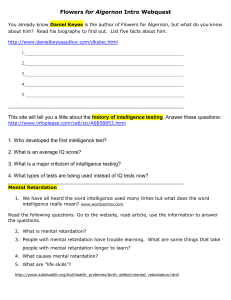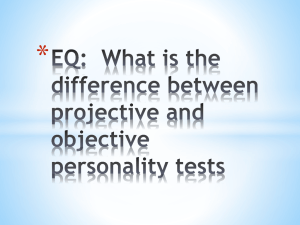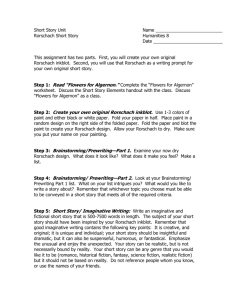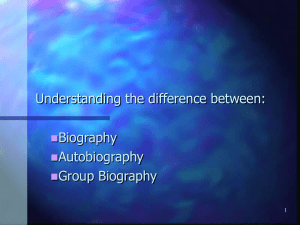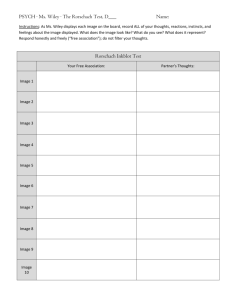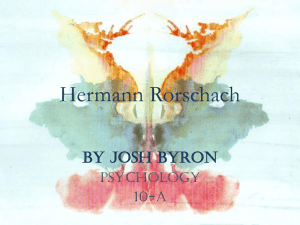Hermann Rorschach - Hunting Hills High School
advertisement
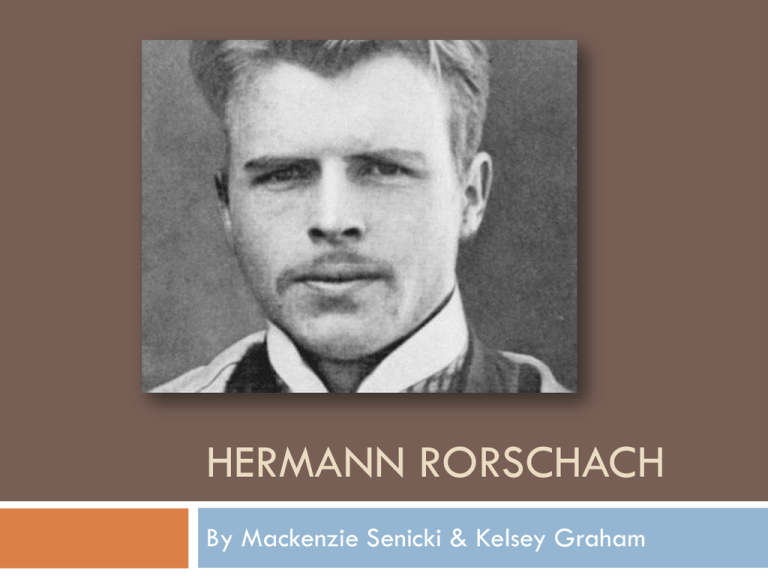
HERMANN RORSCHACH By Mackenzie Senicki & Kelsey Graham Biography Born November 8, 1884 in Zurich, Switzerland Eldest of 4 children At age 2, moved to Schafflausen, where his father taught art at local schools Lost his mother at age 12 and his father at 19 After high school (1904) studied geology and botany at Academie de Neuchate for one term Biography Completed a course in French at University de Dijon Entered medical school at University of Zurich At age 22, he decided to become a psychiatrist Winter term 1906/1907 studied in Berlin, then traveled to Russia to study for one semester Continued studies at University of Zurich and graduated in the spring of 1909 Biography He worked as a resident in Thurgovian Psychiatric Hospital in Munsterlingen, Switzerland in 1909 Married his fellow student Olga Stempelin from Russia His doctoral dissertation was published in 1912 Moved to Russia in 1913 and obtained a well paying job in Krjukovo Asylum near Moscow Biography In July 1914, accepted a job in Switzerland as resident at Waldan Psychiatric University Hospital near Berne 1 year later, was appointed associate director of the Asylum at Herisau In 1917, his first child Elizabeth was born In 1919, his second child Wadid was born The Inkblot Test Background In 1919-1920, he came up with the inkblot test and tried to get 15 cards published No one would agree to publish his inkblots because of high printing costs In 1921, he found a publisher who agreed to only print 10 cards On April 2, 1922, he died at the age of 37 from peritonitis, caused by a burst appendix after only 4 years of using the inkblot test The Inkblot Test Purpose Used to determine information about an individual’s personality functioning Ex. Thought processes, perceptions, motivations, attitude toward environment, internal & external pressures, illogical or psychotic thought patterns Used for diagnostic processes Ex. Depression, schizophrenia, anxiety disorders, developmental problems in children & adolescents The Inkblot Test Consisted of ten cards each containing inkblots Five were in colour and the other were in black and white The subject was first asked what they saw Then the cards are shown a second time and are asked to explain any ambiguous responses and to point out what part in the picture made them react The Inkbot Test The interviewer records and social behaviour and then evaluated by the following; Location: does the subject respond to the whole inkblot or specific parts of it? Quality: does the subject respond to the colour, shade, or what they perceive as movement? The Inkblot Test Content: does the subject perceive animals, humans, and animate or inanimate objects? Conventionality: How do the responses compare statistically with average responses. Bibliography http://www.zb.unibe.ch/rorschach/en/kurzbiografi e.html http://www.encyclopedia.com/topic/Hermann_Rors chach.aspx http://www.phil.gu.se/fu/who.html Google Images
